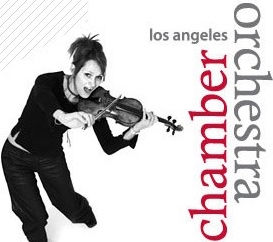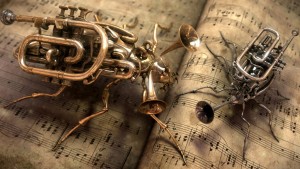MUSICAL NATURE
It isn’t so uncommon when an up-and-coming piano player has all the right moves but has yet to incorporate personality into their work. Making his Los Angeles premiere with the L.A. Chamber Orchestra last night, Italian pianist Alessio Bax demonstrated a youthful command of Mozart’s Piano Concerto No. 24, but lacked the oomph expected when appearing with a world-class organization such as LACO. Yet Mr. Bax is a 35-year-old professional who has appeared as soloist with the best orchestras in the world, and has collaborated with conductors such as Miguel 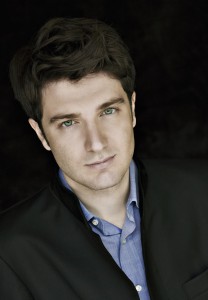 Harth-Bedoya and Sir Simon Rattle. Professional, courteous, and handsome, Bax dutifully followed conductor Hans Graf (making his LACO debut), but I believe more give-and-take would have made this pleasing affair one which could have blown us away.
Harth-Bedoya and Sir Simon Rattle. Professional, courteous, and handsome, Bax dutifully followed conductor Hans Graf (making his LACO debut), but I believe more give-and-take would have made this pleasing affair one which could have blown us away.
It’s true that Mozart’s work, only one of two of his concertos in a minor key, doesn’t call for much other than control and precision. Some may argue that Mr. Bax delivered precisely what is called for, and he kept his playing within Classical strictures, but I missed a distinctive style in the vein of Daniil Trifonov. While it is possible to fit in an edginess or bite, there was nonetheless a limber, self-assured straightforwardness in his playing which actually allowed for oboes, clarinets, trumpets and timpani to be on equal footing (this is, after all, the largest orchestra Mozart uses in this genre). His left hand arpeggios were faultless and smooth, and his glossy legato actually lessened some of the concerto’s darker aspects. To Bax’s defense, sitting under the balcony at the Alex Theater tends to muddy the acoustics, and interrupts the immediacy of the performance (the remaining concert will be played at UCLA’s Royce Hall, where the updated acoustics are admittedly richer).
Beethoven said, “No one can love the country as much as I do. For surely woods, trees, and rocks produce the echo which man desires to hear.” His love of nature inspired his Sixth Symphony, and while rarely titling his works, on this he inscribed: “Pastoral Symphony, or Recollections of Country Life.” For those who are accustomed to hearing Beethoven’s Pastoral with a large orchestra, Graf took advantage of the chamber orchestra by pulling out the moods of an idyllic countryside from his players in a way that made me feel as though I was hearing it 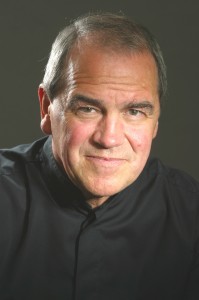 for the first time, including the onomatopoeic sounds of a cuckoo (Joshua Ranz’s clarinet), nightingale (David Shostac’s flute), and quail (Allan Vogel’s oboe).
for the first time, including the onomatopoeic sounds of a cuckoo (Joshua Ranz’s clarinet), nightingale (David Shostac’s flute), and quail (Allan Vogel’s oboe).
Graf wisely avoided histrionics with a faithful interpretation that began with a tranquil yet assured pace. The power really got going in the third movement (you could actually picture the merry peasants dancing to the amazing brass section), and Graf’s brisk and forceful leadership resulted in the perfect storm in the fourth movement. As with the baritone vocalist in a Barbershop Quartet, the cello’s voicing can sometimes be difficult to discern, yet I can’t recall when I have heard this section so succinctly during the Sixth (having those gentle bulls Andrew Shulman and Armen Ksajikian as principals doesn’t hurt). Nico Abondolo and Steve Dress brought character to the basses, but they were occasionally muted by the ensemble. The clarity and pitch of the horns was exquisite, and Richard Todd and Kristy McArthur Morrell played strong and sweet. To be frank, I have no idea what the bassoon represents, but am I wrong to imagine Kenneth Munday’s crisp and playful reading as dancing ducks?
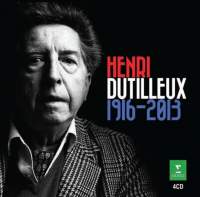 While the Pastoral evokes zoological images, Henri Dutilleaux’s Mystère de l’instant, which opened the program, could easily be the theme song for entomology. The ten movements, played without pause, are indeed mysterious in both construction and sound. This fascinating work reinforces the smart programing of LACO: I would never ever listen to this on a CD at home, but I was enthralled to see it live. Dominated by the atonality of spidery strings, this 1989 work is what would have happened had Bernard Herrmann scored a Kurosawa film. At one point, the dynamics, pitch, and timbre change almost continuously; it’s nearly incomprehensible that the music is even written down. Dutilleaux was clearly having a blast with musical creation, utilizing the cimbalom (a type of dulcimer here played by Theresa Dimond) and percussion (I loved watching Wade Culbreath scratching the gong with his fingertips). For those who don’t mind envisioning buzzing bees and creepy-crawly cockroaches, this strange and wondrous short work will drive you buggy’”in a good way.
While the Pastoral evokes zoological images, Henri Dutilleaux’s Mystère de l’instant, which opened the program, could easily be the theme song for entomology. The ten movements, played without pause, are indeed mysterious in both construction and sound. This fascinating work reinforces the smart programing of LACO: I would never ever listen to this on a CD at home, but I was enthralled to see it live. Dominated by the atonality of spidery strings, this 1989 work is what would have happened had Bernard Herrmann scored a Kurosawa film. At one point, the dynamics, pitch, and timbre change almost continuously; it’s nearly incomprehensible that the music is even written down. Dutilleaux was clearly having a blast with musical creation, utilizing the cimbalom (a type of dulcimer here played by Theresa Dimond) and percussion (I loved watching Wade Culbreath scratching the gong with his fingertips). For those who don’t mind envisioning buzzing bees and creepy-crawly cockroaches, this strange and wondrous short work will drive you buggy’”in a good way.
photos by Lisa-Marie Mazzucco and Christian Steiner
artwork by Balázs Pápay
Los Angeles Chamber Orchestra
DUTILLEUX: Mystère de l’instant
MOZART: Piano Concerto No. 24 in C minor
BEETHOVEN: Symphony No. 6 in F major, Pastoral
Saturday, November 16, 8 pm
Alex Theatre, Glendale
Sunday, November 17, 7 pm
Royce Hall, UCLA
for tickets, call 213 622 7001×1 or visit http://laco.org/
